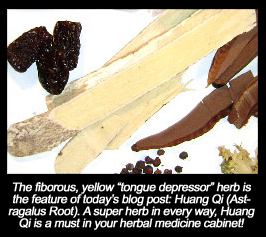#1 Immune Boosting Chinese Herb Analyzed, Ⅰ
Truly Amazing! The Active Ingredients of #1 Immune Boosting Chinese Herb Analyzed
Ⅰ: Introduction and Background

We are taking a look at a Chinese Herb that is known as the leader among all of the Chinese Herbs. This, and all Chinese Herbs are named and defined by the roles they fulfill in relation to one another when being decided for a given formulas.
In this day in age, we are very fortunate to have the incredible knowledge that science and technology has available to us. With this in mind, we will take an in-depth look into one of the most important herbs in all of Chinese Herbal Medicine.
We will reveal both the Chinese Medicine usage point of view and a scientific look into the functions of some of the active ingredients found within it. Prepare to be amazed! This Chinese Herb is definitely one you will want to have in your Chinese Herbal Medicine Cabinet.
Chinese Name: Huang Qi
Translation of Chinese Name: Yellow Leader
Common Name: Astragalus Root
Botanical Name: Astragalus membranaceus
Other Name: Mongolian Milk Vetch Root
Nature: Sweet, Warm, Tonic
Meridians: Spleen, Lung
Chinese Medicine Description of Huang Qi:
Huang Qi is used mainly to tonify your Chi source and to restore the Yang Energy of your body. Huang Qi is one of the first, and most utilized Chinese Herbs in Chinese Herbal Medicine dating back to around 100 A. D. Its name is translated as Yellow Leader. It is used for numerous disharmonies such as:
- Spontaneous or excess perspiration
- Low energy
- Cellular regeneration
- Edema (especially upper body Edema)
- Slow healing wounds
- Internal injuries
- Loose stools [diarrhea due to spleen/lung weakness, wet-phlegm chronic cough]
- Low immune
- Prolapsed organs
It is also useful in treating night sweating, joint pain, skin ulcers, burns and anemia.
Huang Qi is high in anti-oxidants, fighting off free-radicals with blood enhancing properties thereby increasing white, red and platelet levels within your bone marrow development.
Huang Qi has been used in China for such serious diseases such as:
- Coronary heart disease
- Congestive heart failure [CHF]
- Ischemic cerebral vascular disease
- Bronchial asthma in pediatrics patients
- B hepatitis
- Nephritis
- Viral coronary disease
- Cellulitis
- Diabetes
- Peptic ulcers
These findings and usages of all the Chinese Herbs listed are strictly found in China and not claimed by H&E CMHC.
